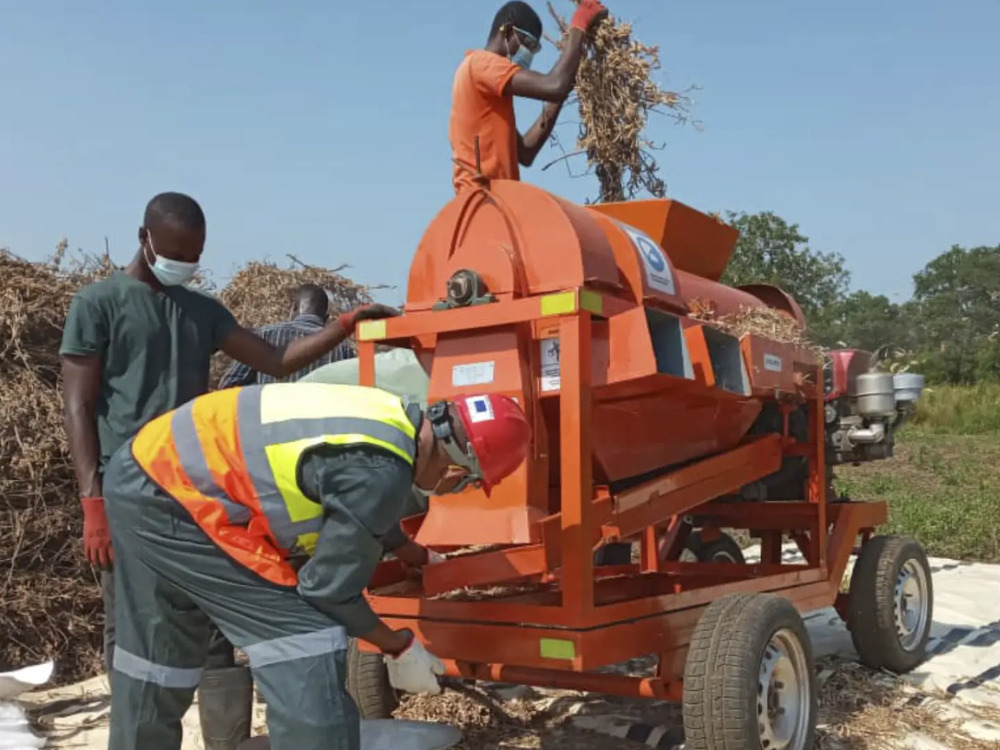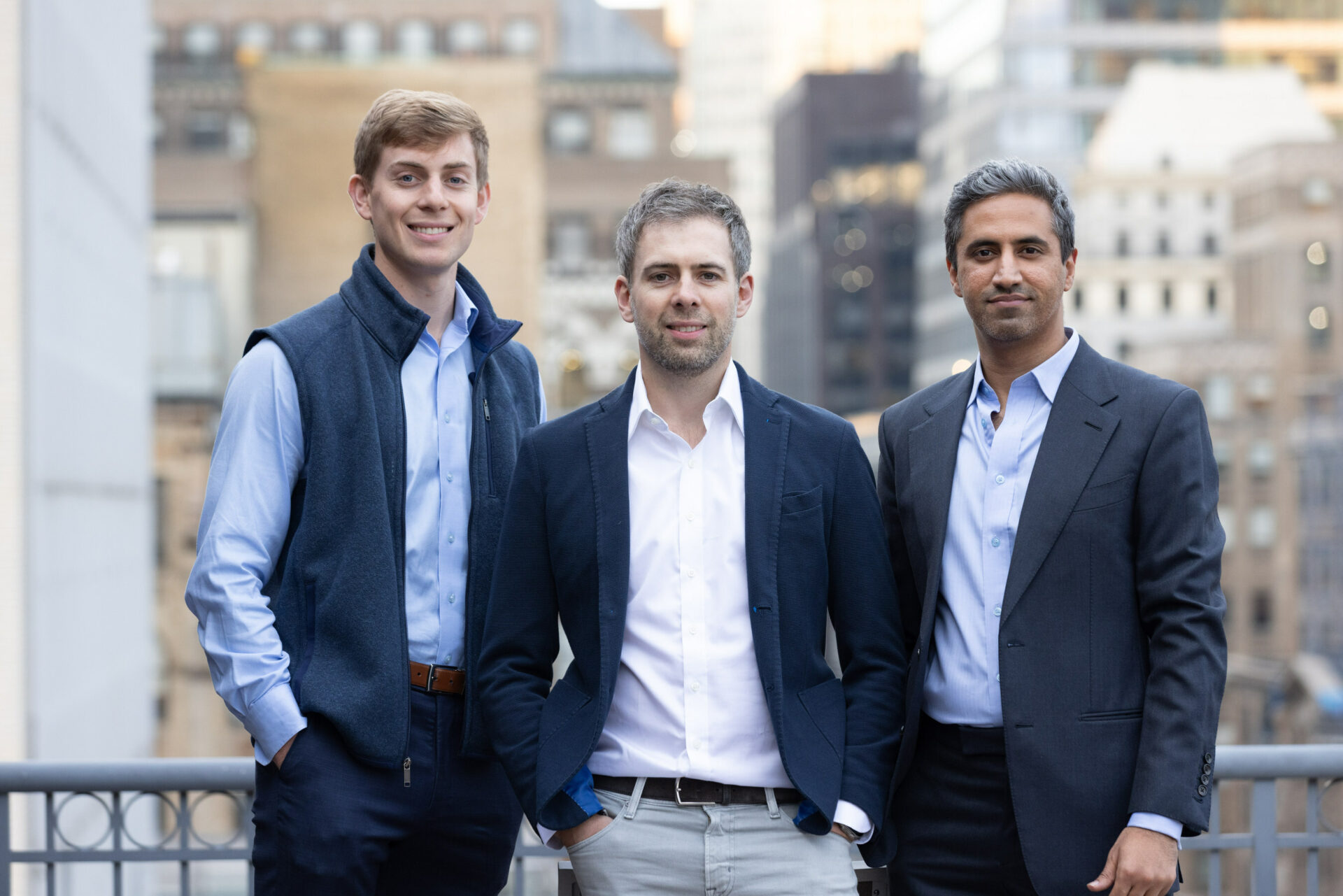Smart agricultural machinery has historically been the domain of large-scale farm operations that can afford the price tag that usually comes with such equipment.
Jeffrey Boakye Appiagyei and the team at Ghana-based SAYeTECH take a different approach to farm mechanization: “We’re dedicated to tackling the everyday struggles of the smallholder farmers,” he tells AgFunderNews.
SAYeTECH combines hardware and Internet of Things (IoT) embedded systems to build tools specific to Africa’s smallholder farming communities. Currently this includes a cocoa pod breaking machine, a cereal dryer and a multi-crop thresher, amongst others.
For Appiagyei and the rest of the company, the goal is not just about addressing the usual slew of labor issues such as productivity. It’s also about providing jobs for young adults and keeping children in the classroom who would normally pulled out of school to help with the harvest.
“At the heart of SAYeTECH is the goal of empowering communities to thrive and build resilience starting with ensuring that children can stay in school,” he says.
SAYeTECH raised a $100,000 seed round led by AgFunder this year and is currently participating in the AgFunder GROW accelerator program. [Disclosure: AgFunder is AgFunderNews’ parent company.]
AgFunderNews recently caught up with Appiagyei to learn more.
For more on emerging startups and initiatives in Africa, check out AgFunder’s Africa AgriFoodTech Investment Report 2024.
AgFunderNews (AFN): What problem does SAYeTECH solve?
JA: SAYeTECH is dedicated to tackling the everyday struggles of smallholder farmers, especially in Ghana.
For too long, farmers across Sub-Saharan Africa have faced low productivity, significant post-harvest losses, and limited access to data that could help them make better decisions.
By creating IoT-enabled machinery and data solutions, we’re helping farmers streamline their processes, boost their yields, and make informed choices, which not only increases their income but also strengthens food security in their communities and allows children to stay in school instead of working on farms.
On a broader level, the data insights we gather through our IoT devices provide valuable information to large institutions and companies in the agricultural sector. These organizations can leverage our data to gain a deeper understanding of crop cycles, productivity trends, and regional farming conditions, enabling them to make strategic decisions that improve supply chain efficiency, promote sustainability, and help de-risk agriculture.
AFN: What was your original motivation behind starting the company?
JA: My co-founder, Theodore [Ohene-Botchway, CTO], and I started SAYeTECH with a vision to transform agriculture in Africa and to keep children in school.
Years ago, I served as a pupil teacher and missionary in a rural Ghanaian community without electricity. During the harvest seasons, I saw parents pulling their children out of school to work on farms, despite the children’s reluctance. This struck me deeply, knowing that a lack of access to mechanization in agriculture was forcing children away from their education.
I shared my concerns with Theodore, who has been my friend from college, and together, we decided to act. With my background in agricultural engineering and his in mechanical engineering, we set out to build practical, accessible tools to support farmers and help kids stay in school.
We wanted to create technology that would help them increase productivity, adapt to the challenges of climate change, and ultimately improve their livelihoods. At the heart of SAYeTECH is the goal of empowering communities to thrive and build resilience starting with ensuring that children can stay in school.
AFN: Tells us about a few notable milestones for the company thus far.
JA: To date we have manufactured over 180 pieces of agricultural equipment and are currently serving over 17,000 smallholder farmers in Ghana, Nigeria, and Niger.
Also, developing our IoT-enabled cocoa pod breaker is a huge leap for us, and it is a game-changer for cocoa farmers and other stakeholders in the cocoa value chain.
Raising $100,000 in Seed funding from AgFunder validated our vision, and launching field trials with farmers showed firsthand how our technology can make a big difference.
We’ve also formed partnerships with organizations like United States Agency for International Development (USAID), Alliance for a Green Revolution in Africa (AGRA), and International Development Enterprises (iDE), which have helped us reach more farmers and expand our impact.

AFN: A few key challenges?
JA: Funding has been a critical hurdle, though we’ve made promising strides.
The recent funding we received allowed us to ramp up production, doubling our revenue compared to last year, a clear sign of growing demand and market potential.
However, we’re still only able to meet 17% of our current orders. This means many farmers who want and need our solutions are still waiting. With additional investment, we could drastically expand our production capacity, reach more communities, and fully leverage our technology to support sustainable growth and increased productivity across the agricultural sector.
There’s a tremendous opportunity ahead, and we’re eager to rise to the challenge with the right resources in place.
AFN: How did you link up with the GROW accelerator program? Why Asia?
JA: We were drawn to GROW because of its strong focus on agrifoodtech and its commitment to supporting companies with global growth ambitions.
Asia is particularly interesting to us because it faces many of the same agricultural challenges as Africa, such as the need for sustainable solutions for smallholder farmers. Through GROW, we aim to learn from Asia’s experience, build partnerships, and explore new market opportunities that can help inform and strengthen our impact back home.
AFN: What’s next?
JA: To get our IoT-enabled machinery into the hands of more farmers.
We aim to deploy at least 1,000 units to help equipment owners, including farmers, boost their productivity and adapt to changing conditions.
Excitingly, our IoT solution isn’t limited to agriculture, giving us a larger market to explore. Currently, we have an order for 50 IoT units from a mining company and hundreds of letters of interest from other potential clients.
We’re also focused on enhancing our data analytics to make our insights even more impactful. Ultimately, we aim to make a lasting impact on agriculture across Africa and beyond, helping farmers thrive and contribute to resilient food systems everywhere.
Source link
Author Jennifer Marston





